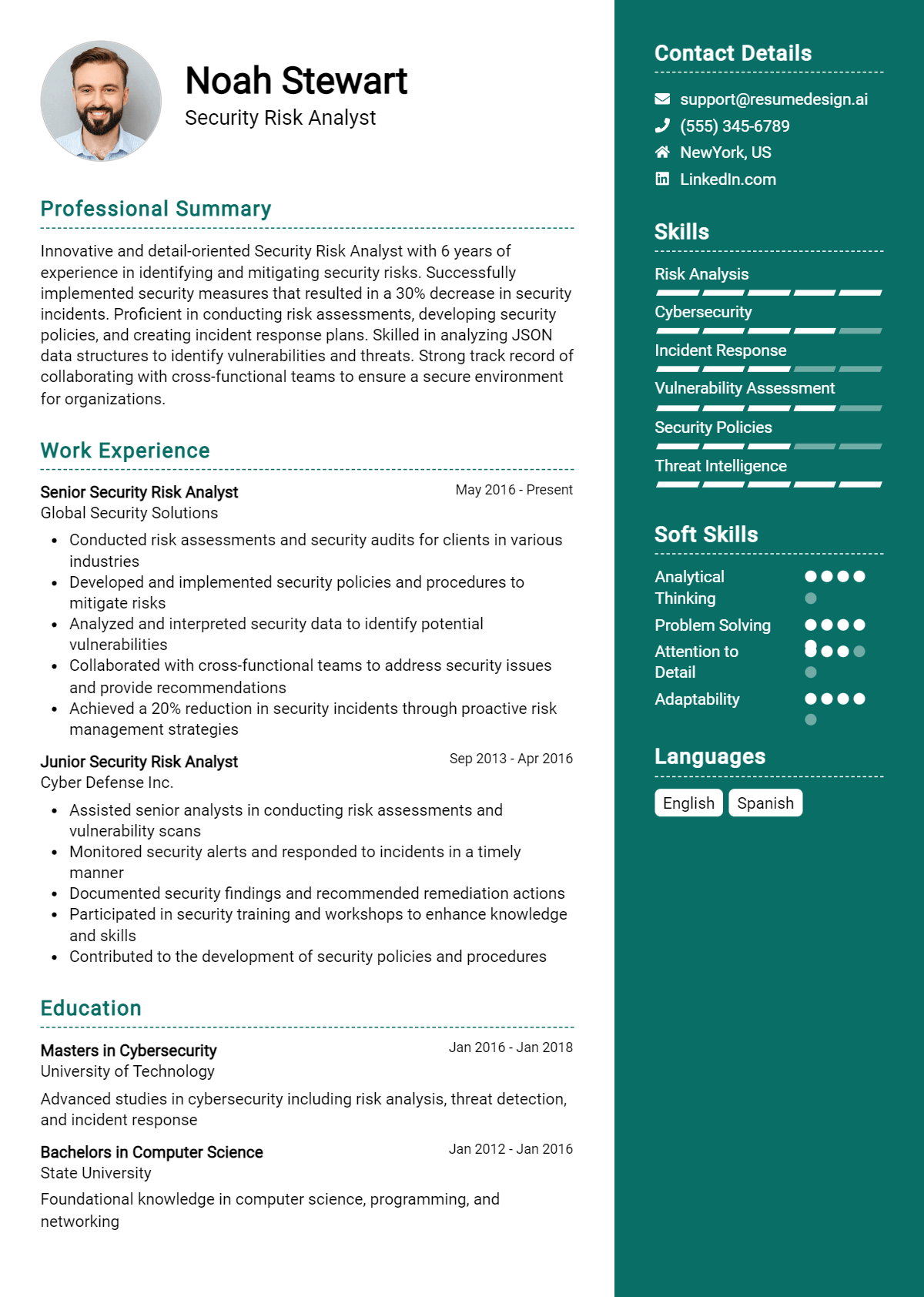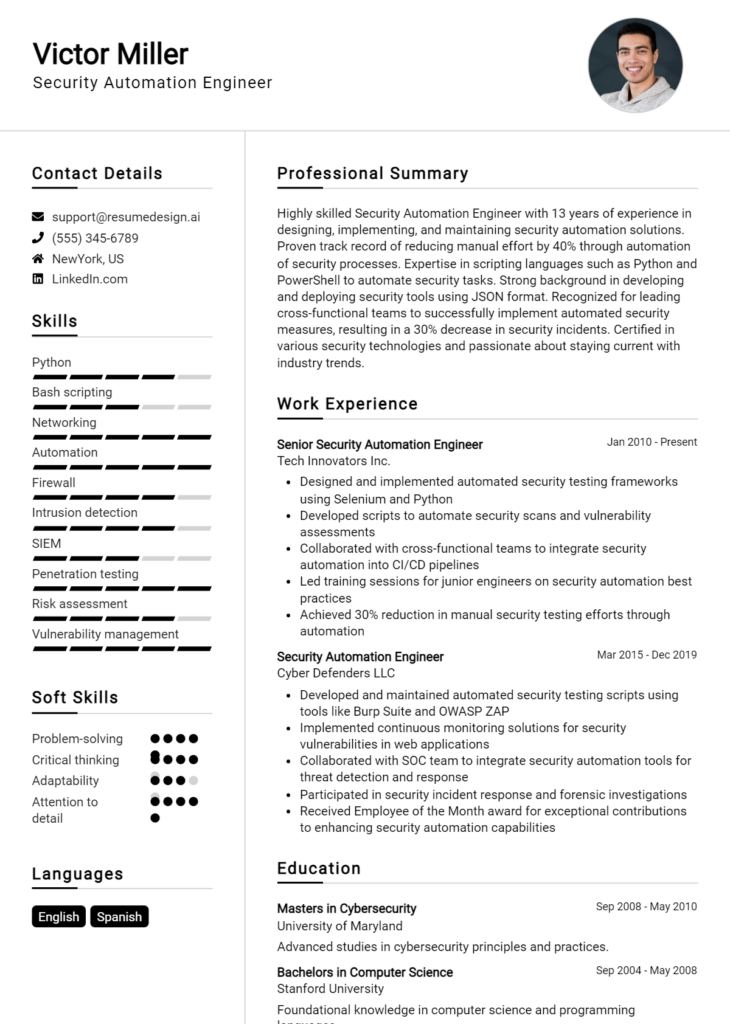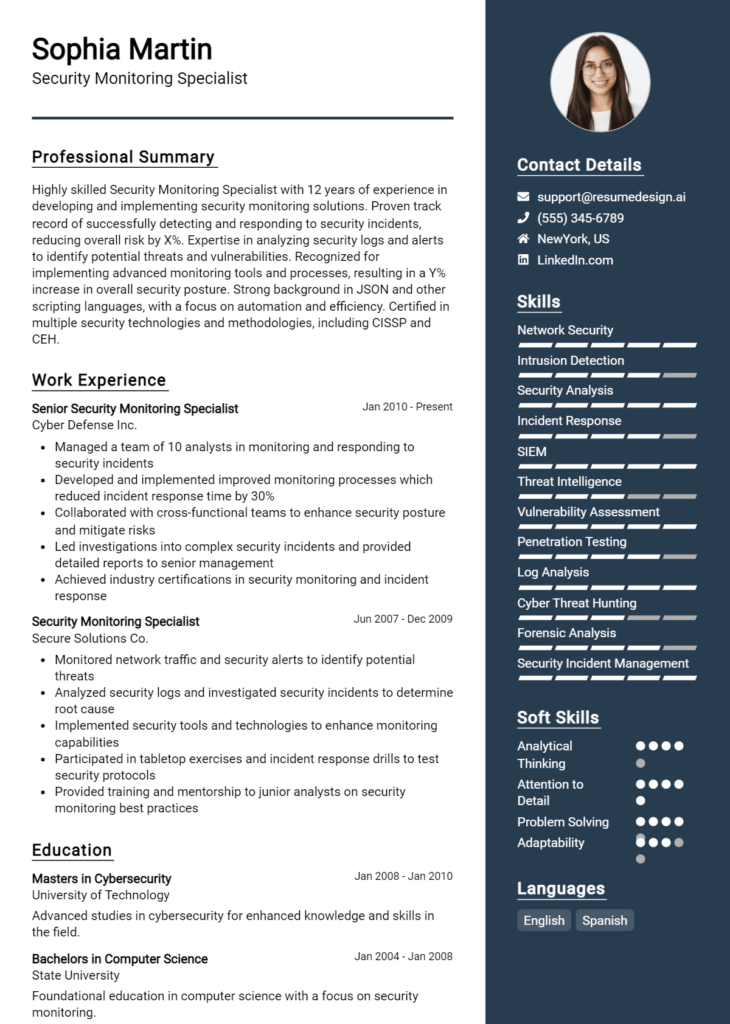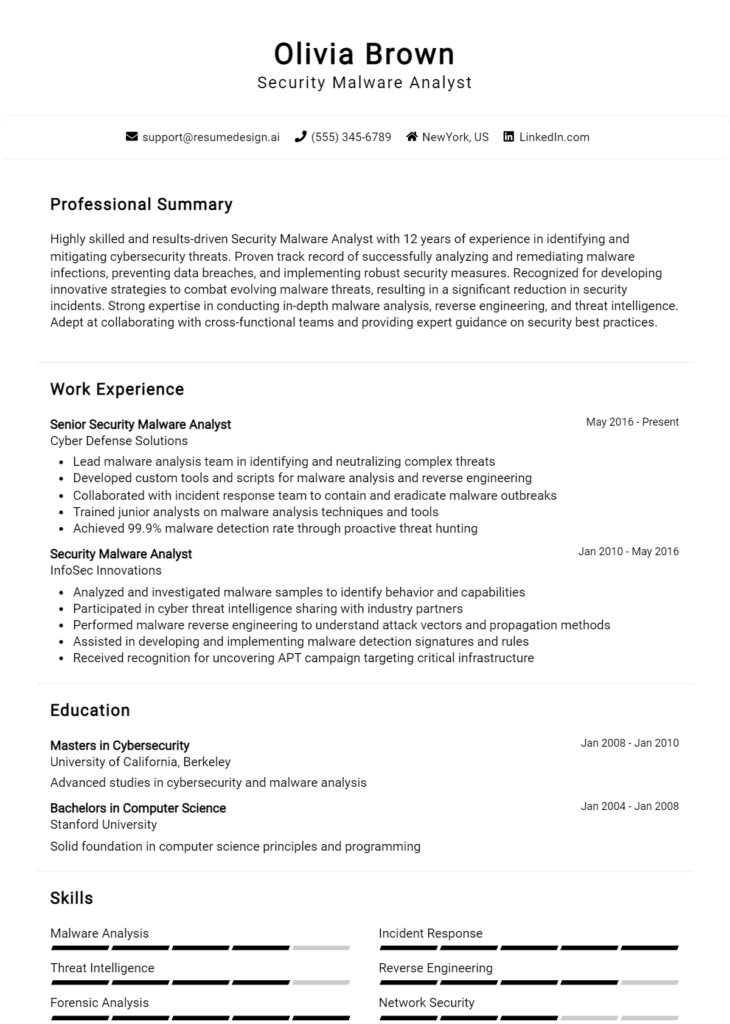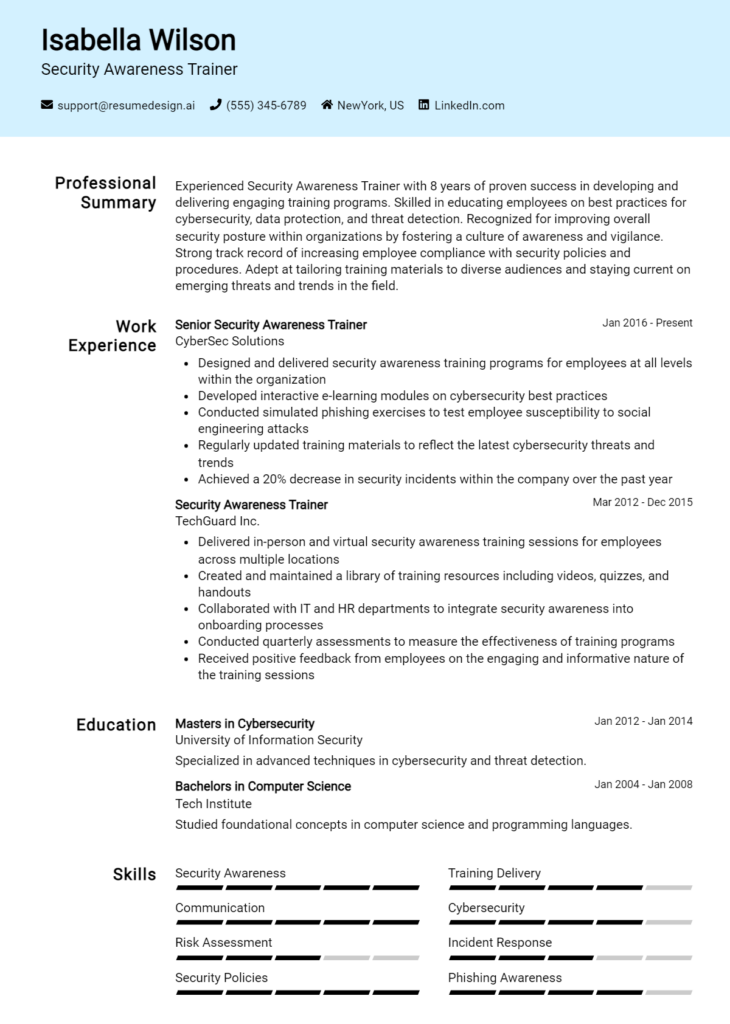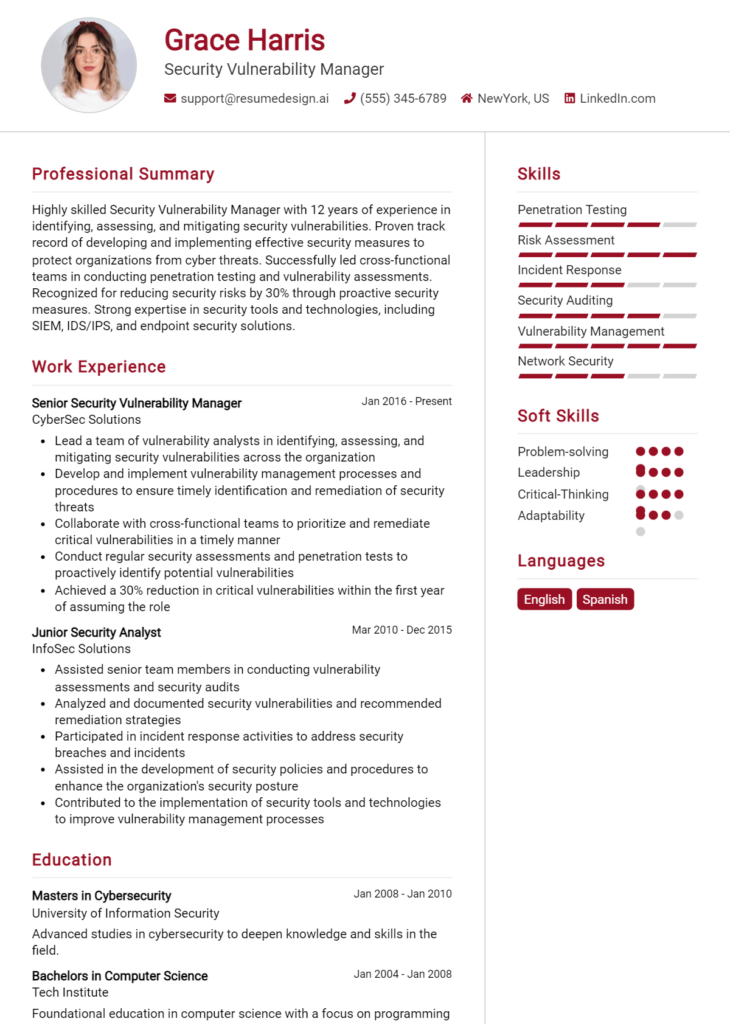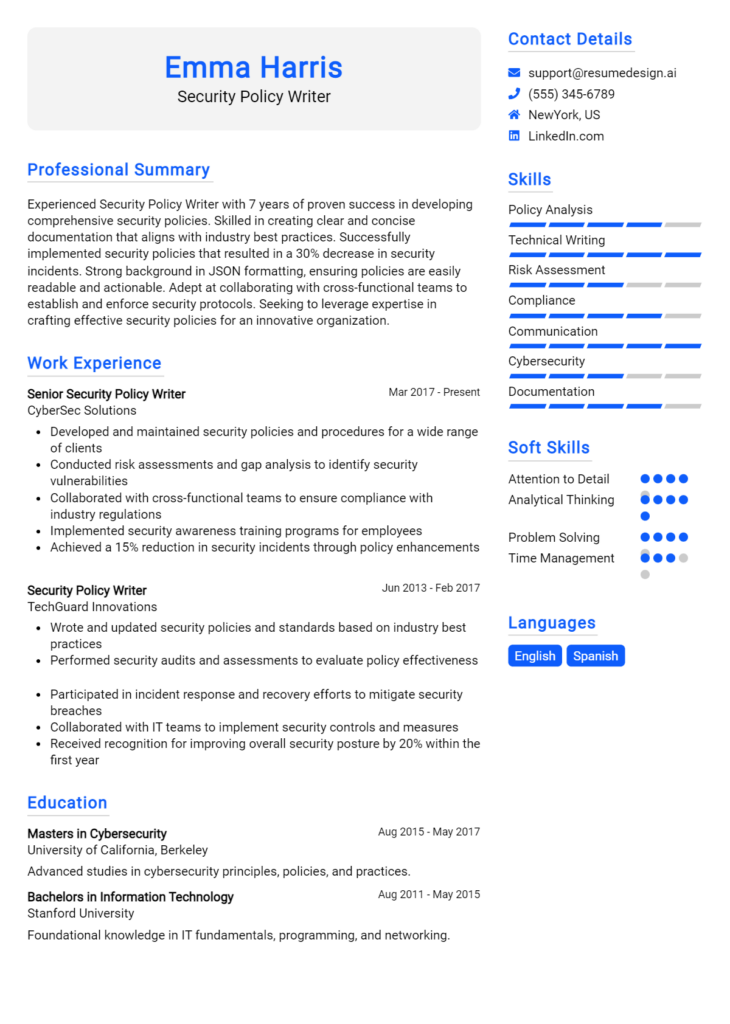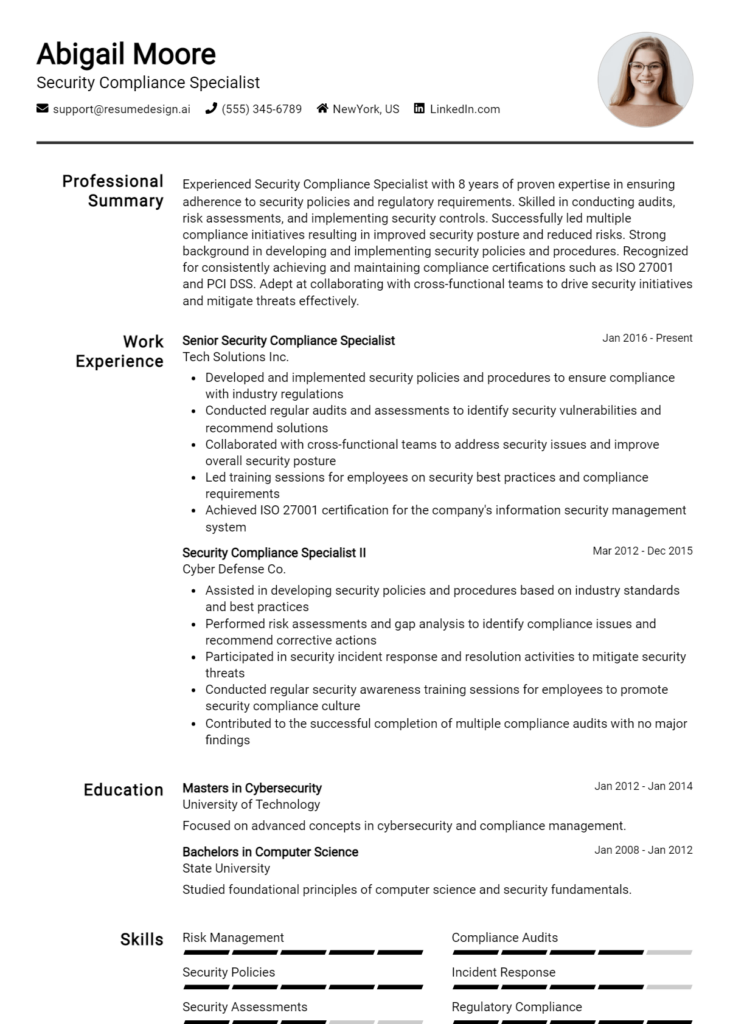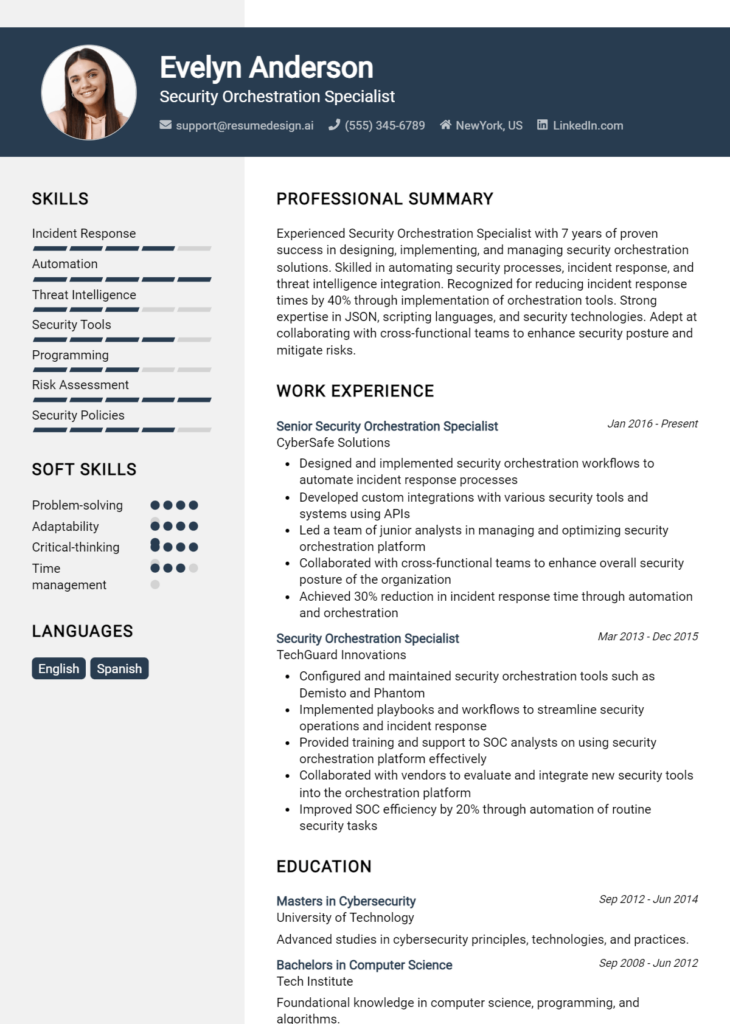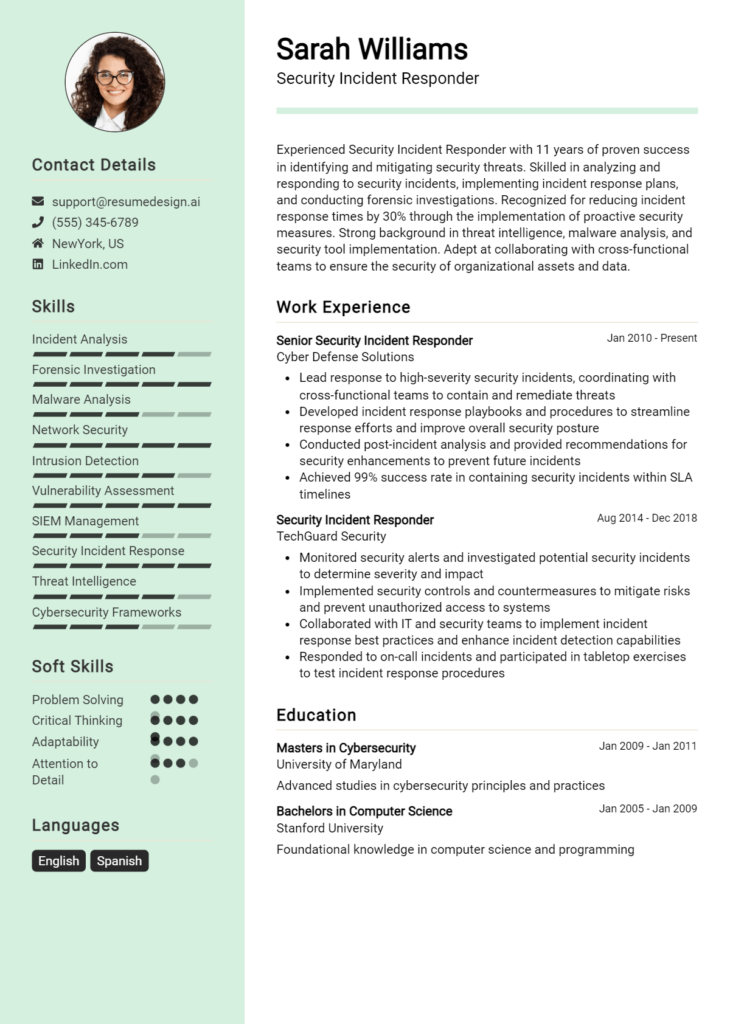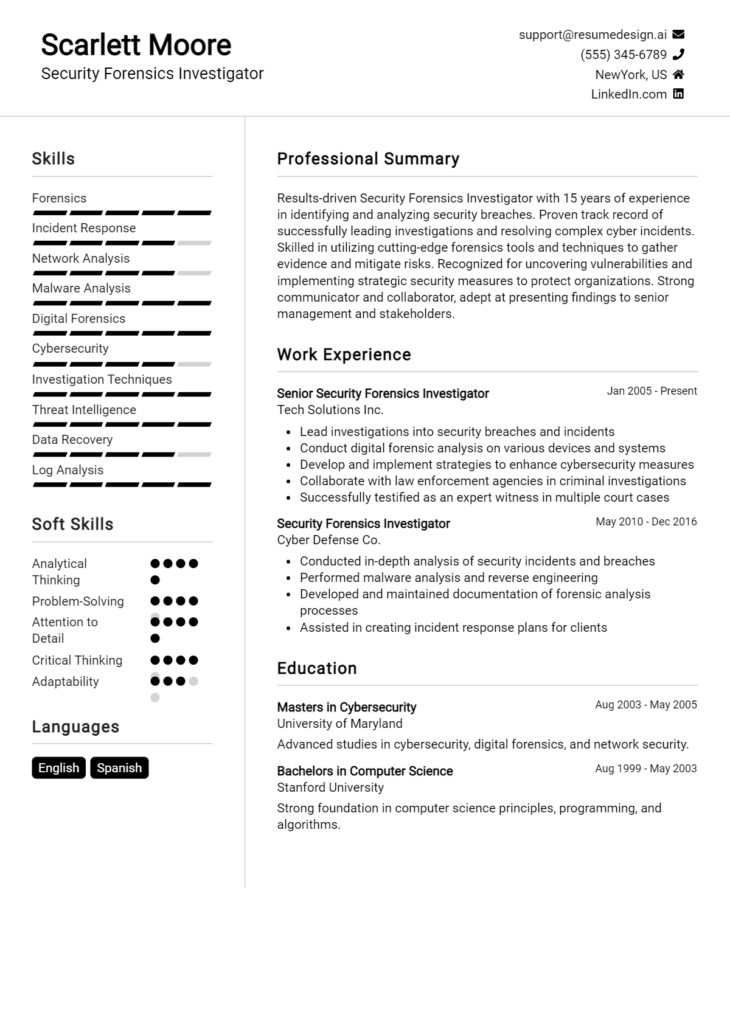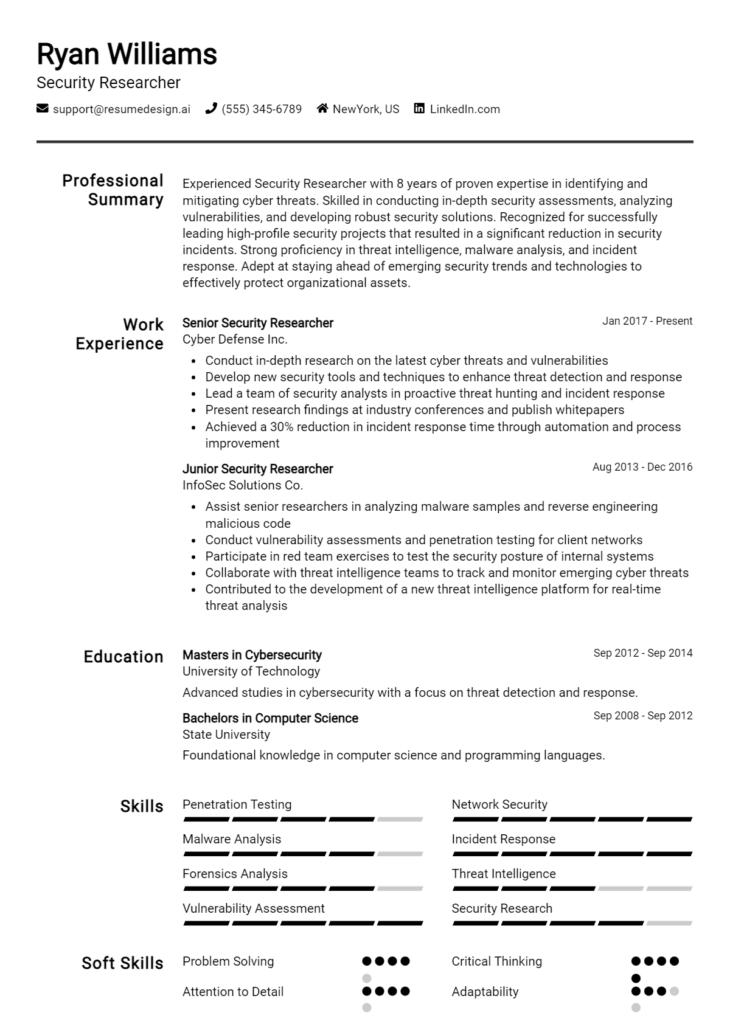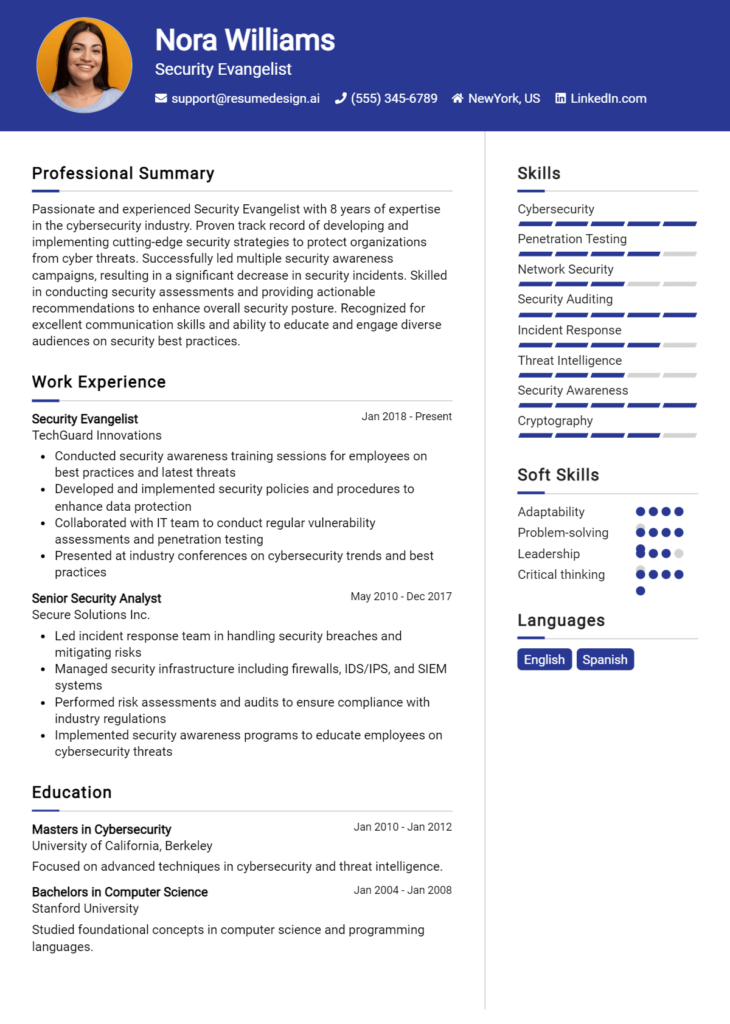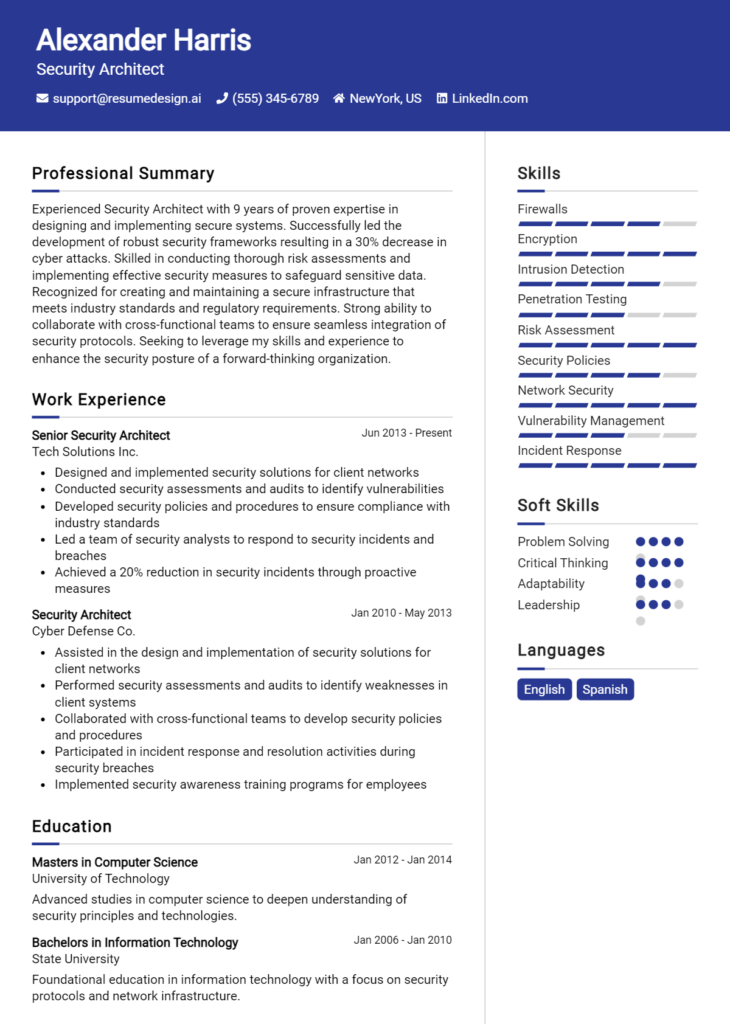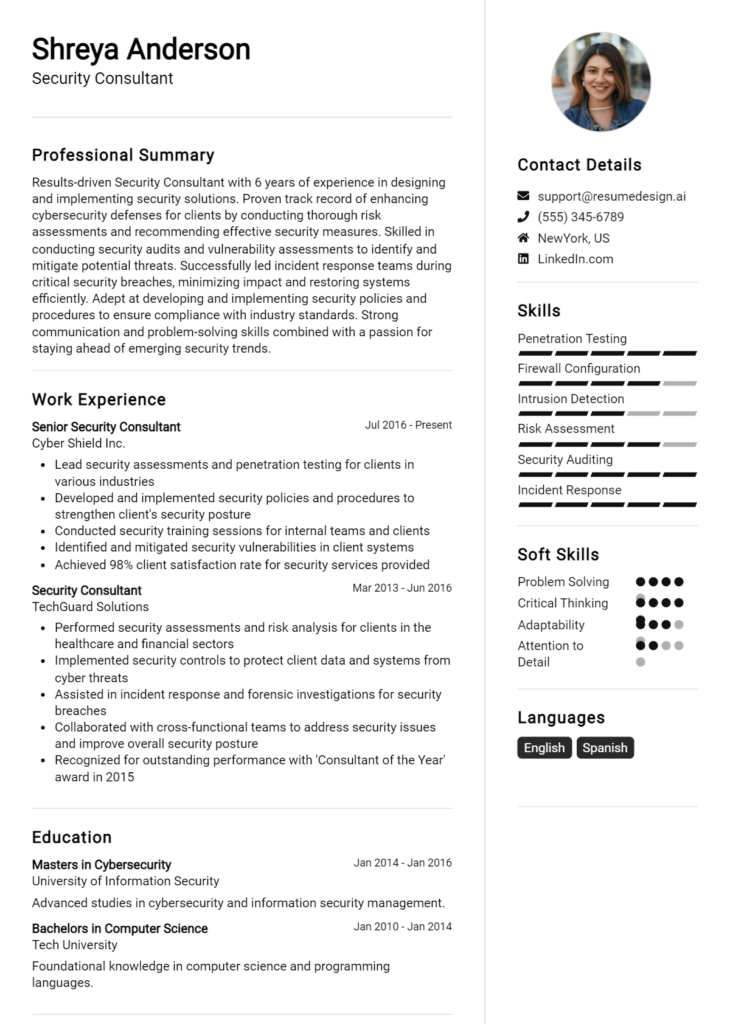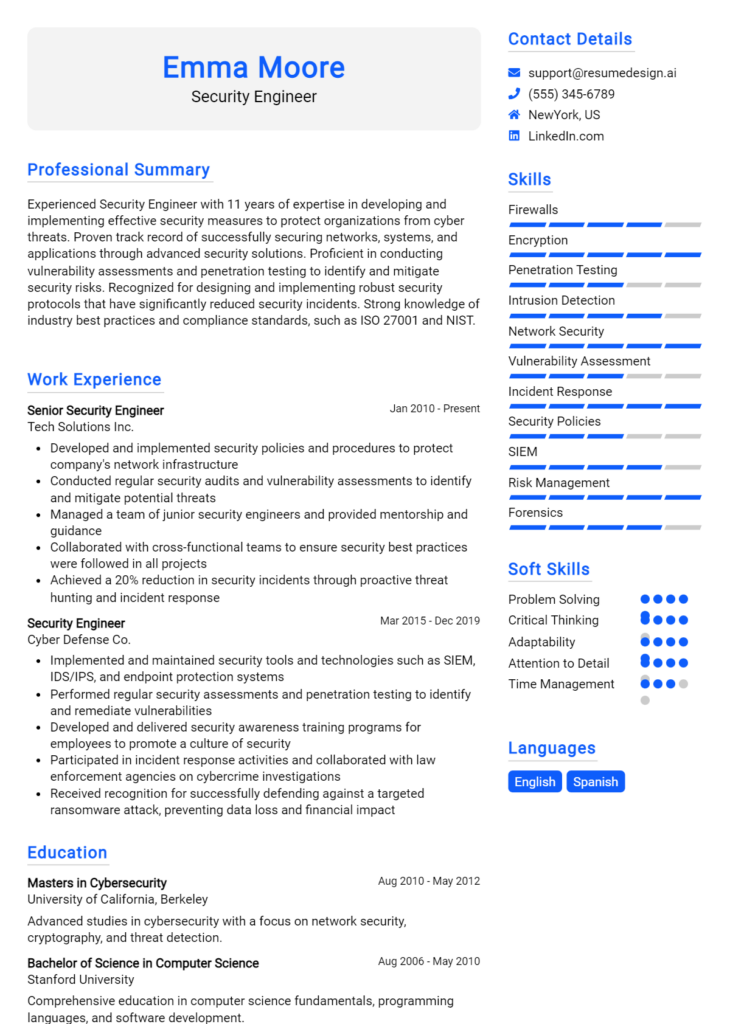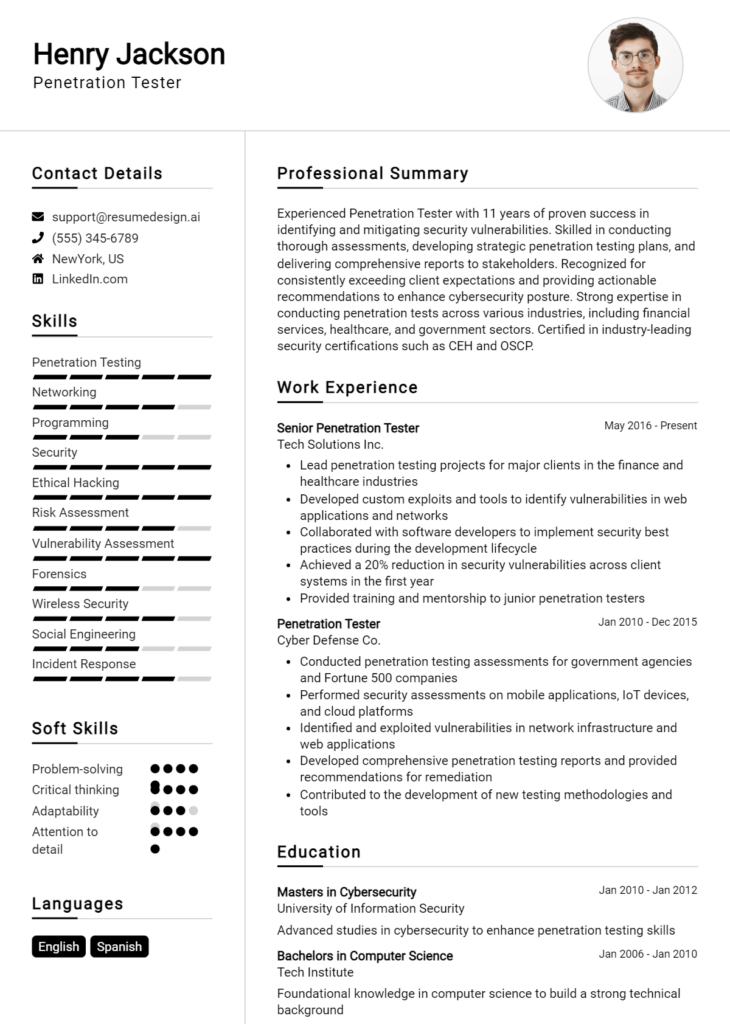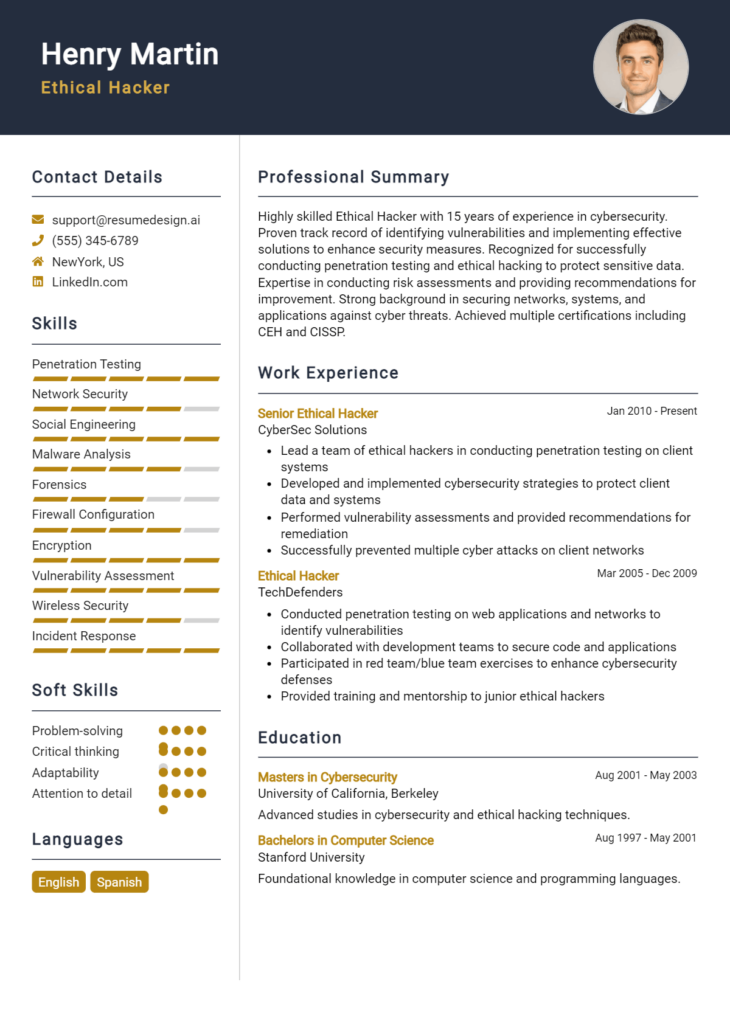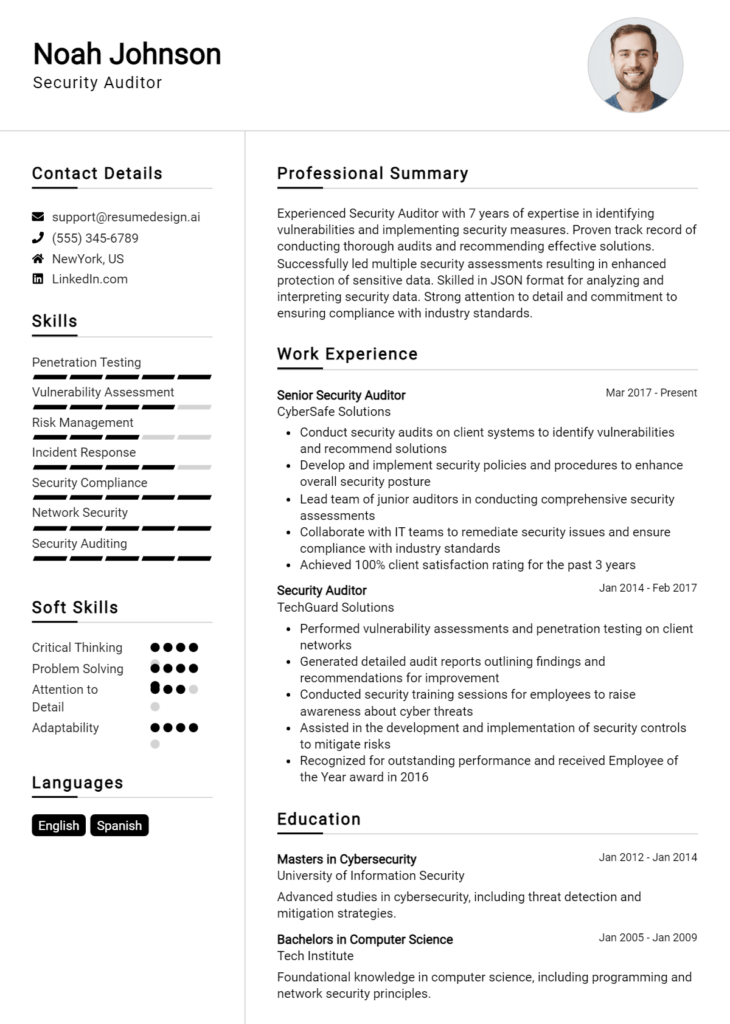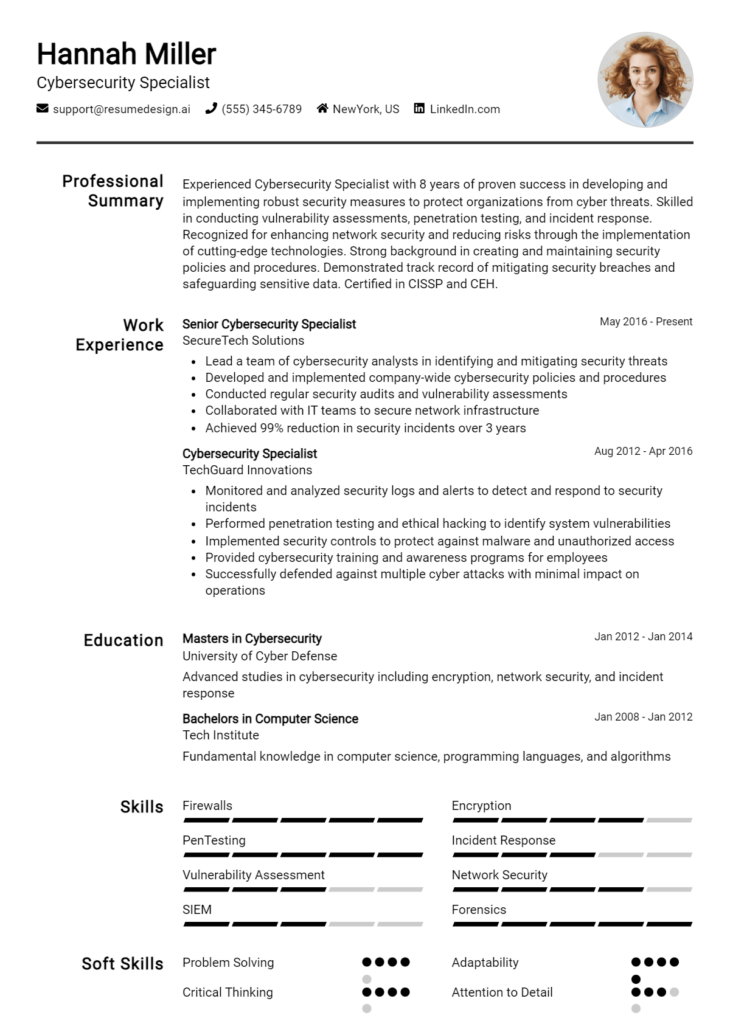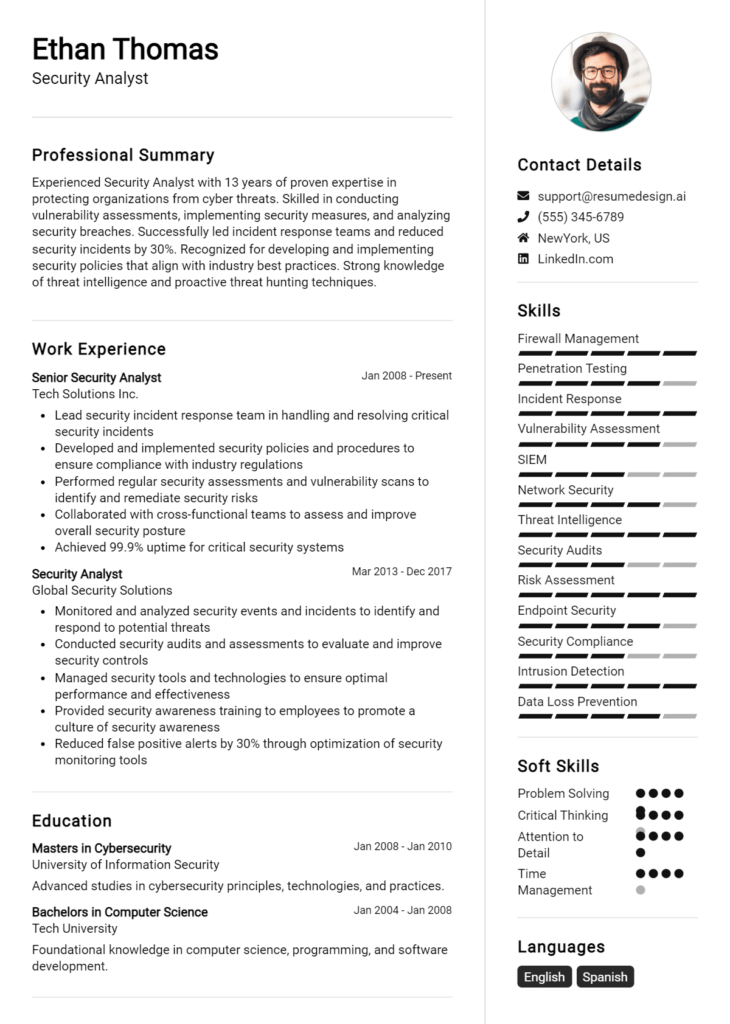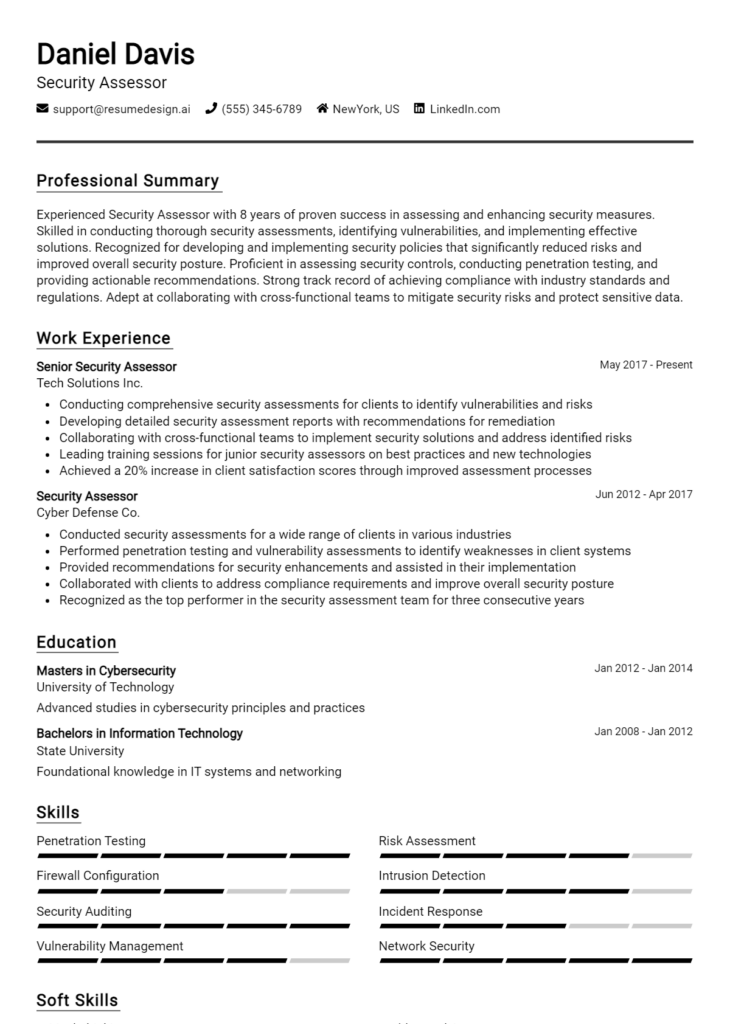Security Risk Analyst Core Responsibilities
A Security Risk Analyst plays a crucial role in safeguarding an organization by identifying, assessing, and mitigating potential security threats. This position requires a blend of technical expertise, operational knowledge, and strong problem-solving abilities, allowing the analyst to bridge departments such as IT, compliance, and management. Effective communication and collaboration are essential for aligning security measures with organizational goals. A well-structured resume that highlights these skills not only demonstrates the candidate's qualifications but also underscores their value in enhancing the organization’s overall security posture.
Common Responsibilities Listed on Security Risk Analyst Resume
- Conduct security risk assessments to identify vulnerabilities and threats.
- Develop and implement risk management strategies and policies.
- Collaborate with IT and compliance teams to ensure adherence to security protocols.
- Monitor security systems for potential breaches and incidents.
- Analyze security incidents and recommend improvements to prevent recurrence.
- Prepare reports on security risks and present findings to management.
- Stay updated on the latest security trends, threats, and technologies.
- Conduct training sessions for staff on security best practices.
- Evaluate third-party vendor security compliance.
- Assist in the development of business continuity and disaster recovery plans.
High-Level Resume Tips for Security Risk Analyst Professionals
In the competitive field of security risk analysis, a well-crafted resume serves as a crucial first impression for potential employers. It is not just a summary of your work history; it is a powerful marketing tool that needs to effectively communicate your skills, qualifications, and achievements in the domain of security. A strong resume can set you apart from the competition, showcasing your expertise in risk assessment, mitigation strategies, and compliance frameworks. This guide will provide practical and actionable resume tips specifically tailored for Security Risk Analyst professionals, empowering you to create a compelling document that captures the attention of hiring managers.
Top Resume Tips for Security Risk Analyst Professionals
- Tailor your resume to match the job description, using keywords and phrases that align with the specific requirements of the position.
- Highlight your relevant experience in security risk assessment, IT security, and compliance, ensuring that this information is easily identifiable.
- Quantify your achievements where possible; for example, mention the percentage reduction in security incidents due to your initiatives.
- Emphasize industry-specific certifications such as CISSP, CISM, or CRISC, which demonstrate your commitment to professional development.
- Utilize action verbs to describe your responsibilities and accomplishments, making your contributions stand out.
- Include a summary statement at the beginning of your resume that encapsulates your skills and what you bring to the role.
- Make sure your resume is visually appealing and easy to read, using clear headings and bullet points to organize information effectively.
- Showcase your knowledge of regulatory frameworks and standards relevant to the industry, such as GDPR, HIPAA, or NIST.
- Incorporate soft skills such as analytical thinking, problem-solving, and communication, which are essential for a Security Risk Analyst role.
By implementing these tips, you can significantly enhance the effectiveness of your resume, increasing your chances of landing a job in the Security Risk Analyst field. A well-structured and targeted resume not only highlights your qualifications but also demonstrates your understanding of the industry's demands, positioning you as a strong candidate in a competitive job market.
Why Resume Headlines & Titles are Important for Security Risk Analyst
In the competitive field of cybersecurity, a Security Risk Analyst plays a crucial role in identifying, assessing, and mitigating risks that could jeopardize an organization’s information systems. A well-crafted resume headline or title is essential for candidates in this field, as it serves as the first impression for hiring managers. A strong headline can immediately capture attention and succinctly summarize a candidate's key qualifications in a single impactful phrase. It should be concise, relevant, and directly related to the job being applied for, ensuring that it resonates with the expectations of potential employers.
Best Practices for Crafting Resume Headlines for Security Risk Analyst
- Keep it concise: Aim for one impactful phrase that summarizes your expertise.
- Be role-specific: Use keywords related to the Security Risk Analyst position to align with job descriptions.
- Highlight key skills: Incorporate relevant skills that demonstrate your qualifications.
- Showcase experience: Mention years of experience or notable achievements to add credibility.
- Use action verbs: Start with strong action verbs to convey confidence and proactivity.
- Avoid jargon: Ensure clarity by avoiding overly technical terms that may not resonate with all readers.
- Tailor for each application: Customize your headline for each job application to reflect the specific role.
- Focus on value: Emphasize what you can bring to the organization rather than just listing qualifications.
Example Resume Headlines for Security Risk Analyst
Strong Resume Headlines
"Proven Security Risk Analyst with 5+ Years of Experience in Cyber Threat Mitigation"
“Dedicated Information Security Professional Specializing in Risk Assessment and Compliance”
“Expert Security Risk Analyst with a Track Record of Successful Security Audits and Vulnerability Management”
“Results-Driven Cybersecurity Analyst Focused on Risk Management and Incident Response”
Weak Resume Headlines
“Security Analyst”
“Experienced Professional Looking for a Job”
The strong headlines are effective because they are specific, highlighting the candidate's experience and expertise in a way that aligns with the expectations of hiring managers in the field of cybersecurity. They convey a clear message about the candidate's qualifications while incorporating relevant keywords that can catch the eye of recruiters. In contrast, the weak headlines fail to impress due to their vagueness and lack of detail, making it difficult for hiring managers to gauge the candidate's suitability for the role. By avoiding generalities and focusing on impactful messaging, candidates can significantly enhance their chances of standing out in a crowded job market.
Writing an Exceptional Security Risk Analyst Resume Summary
The resume summary is a critical component for a Security Risk Analyst as it serves as the candidate's first impression to hiring managers. A well-crafted summary quickly captures attention by succinctly highlighting key skills, relevant experience, and notable accomplishments that align with the job role. In a competitive job market, a strong summary is concise, impactful, and tailored to the specific position, ensuring that the candidate stands out amongst a sea of applicants and sets the tone for the rest of the resume.
Best Practices for Writing a Security Risk Analyst Resume Summary
- Quantify Achievements: Use numbers and metrics to illustrate the impact of your work.
- Focus on Relevant Skills: Highlight skills that are directly related to security risk analysis.
- Tailor for the Job Description: Customize your summary to reflect the specific requirements of the job you're applying for.
- Use Action Verbs: Start sentences with strong verbs to convey confidence and proactivity.
- Keep it Concise: Aim for 3-5 sentences that deliver maximum information in a brief format.
- Showcase Industry Knowledge: Incorporate relevant terminology and trends in the security field.
- Highlight Certifications: Mention any relevant certifications or training that enhance your qualifications.
- Create a Hook: Start with a powerful statement that piques interest in your expertise.
Example Security Risk Analyst Resume Summaries
Strong Resume Summaries
Detail-oriented Security Risk Analyst with over 5 years of experience in identifying, assessing, and mitigating risks in IT systems. Achieved a 30% reduction in security incidents by implementing a comprehensive risk management framework.
Results-driven professional with a proven track record of developing and executing security policies. Enhanced organizational compliance by 25% through rigorous audits and staff training programs.
Proficient in threat analysis and vulnerability assessment, successfully leading a team that identified and resolved 200+ potential security threats, significantly strengthening the company’s security posture.
Certified Information Systems Security Professional (CISSP) with expertise in risk assessment and mitigation strategies. Instrumental in reducing data breach risks by 40% through proactive security measures and incident response planning.
Weak Resume Summaries
Security Risk Analyst seeking to leverage skills in a new role. I have experience in security and analysis.
I am a motivated professional with some experience in security roles looking for opportunities to grow.
The strong resume summaries are effective because they clearly quantify achievements, highlight specific skills relevant to the role, and demonstrate a direct connection to the responsibilities of a Security Risk Analyst. In contrast, the weak summaries are vague and lack the necessary detail and impact to engage hiring managers, making them less memorable and ineffective in showcasing the candidate's qualifications.
Work Experience Section for Security Risk Analyst Resume
The work experience section of a Security Risk Analyst resume is a critical component that provides potential employers with a clear view of the candidate's technical skills, leadership capabilities, and commitment to delivering high-quality products. This section not only highlights specific responsibilities and projects but also emphasizes the applicant's ability to manage teams effectively and implement security protocols that align with industry standards. Quantifying achievements, such as reductions in risk or improvements in security measures, is essential to demonstrate the candidate's impact in previous roles, making this section a key element in showcasing their qualifications for the position.
Best Practices for Security Risk Analyst Work Experience
- Detail specific technical skills relevant to security risk analysis, such as vulnerability assessments and risk management frameworks.
- Quantify achievements with measurable outcomes, such as percentages or dollar amounts saved through implemented security measures.
- Highlight collaboration with cross-functional teams, including IT, compliance, and management, to demonstrate teamwork and communication skills.
- Use action verbs to describe contributions and responsibilities, making the experience sound dynamic and impactful.
- Align experiences with industry standards and best practices to show familiarity with current regulations and technologies.
- Include any certifications or relevant training that enhances your credibility in the field.
- Focus on results-driven narratives that showcase problem-solving skills and successful project outcomes.
- Keep the descriptions concise yet detailed enough to convey the significance of your experiences.
Example Work Experiences for Security Risk Analyst
Strong Experiences
- Led a team of analysts to conduct a comprehensive risk assessment, resulting in a 30% reduction in potential security threats over one year.
- Implemented a new intrusion detection system that decreased incident response time by 40%, significantly enhancing the organization's cybersecurity posture.
- Collaborated with IT and compliance departments to develop and roll out a security training program, achieving a 95% employee completion rate and increasing security awareness.
- Spearheaded a security vulnerability remediation project that reduced exposure to high-risk vulnerabilities by 75% within six months.
Weak Experiences
- Responsible for monitoring security systems and reporting issues.
- Assisted in some security-related projects and tasks.
- Participated in team meetings to discuss security matters.
- Helped with the implementation of security policies.
The examples provided illustrate the significant difference between strong and weak experiences. Strong experiences are characterized by quantifiable outcomes and specific contributions that clearly demonstrate the candidate's expertise and impact in the security field. In contrast, weak experiences lack detail and fail to convey any measurable achievements, making them less impressive to potential employers. By focusing on concrete results and leadership roles, candidates can effectively showcase their qualifications as Security Risk Analysts.
Education and Certifications Section for Security Risk Analyst Resume
The education and certifications section of a Security Risk Analyst resume is crucial as it serves to underscore the candidate's academic achievements, relevant industry certifications, and commitment to continuous professional development. This section provides hiring managers with insight into the candidate's foundational knowledge and expertise in security risk management, demonstrating a clear alignment with the job's demands. By including relevant coursework, recognized certifications, and specialized training programs, candidates can significantly enhance their credibility and present themselves as well-qualified and dedicated professionals in the field.
Best Practices for Security Risk Analyst Education and Certifications
- Prioritize relevant degrees such as a Bachelor’s or Master’s in Cybersecurity, Information Technology, or Risk Management.
- Include industry-recognized certifications like CISSP, CISM, or CRISC, which are highly regarded in the security field.
- Detail specific coursework that aligns with security risk analysis, such as Risk Assessment, Security Policy Development, or Incident Response.
- Highlight any specialized training or workshops attended that demonstrate a commitment to staying current with industry trends.
- Use clear and concise formatting to make the section easy to read and scan for key information.
- Incorporate dates for education and certifications to show the recency and relevance of qualifications.
- Showcase any honors or distinctions received during academic pursuits to stand out among other candidates.
- Group certifications by category (e.g., technical, managerial) to provide a clearer picture of expertise areas.
Example Education and Certifications for Security Risk Analyst
Strong Examples
- Bachelor of Science in Cybersecurity, University of Technology, 2020
- Certified Information Systems Security Professional (CISSP), (ISC)², 2021
- Master of Science in Risk Management, National University, 2022
- Coursework: Risk Assessment Techniques, Cybersecurity Frameworks, and Compliance Standards
Weak Examples
- Bachelor of Arts in History, State University, 2015
- Certification in Basic Computer Skills, Online Learning Platform, 2019
- High School Diploma, Local High School, 2010
- Completion of an outdated course on Internet Safety, 2016
The strong examples are considered appropriate because they directly relate to the qualifications and skills needed for a Security Risk Analyst role, showcasing relevant degrees and certifications that are recognized in the industry. In contrast, the weak examples are less effective as they highlight irrelevant educational backgrounds and outdated or generic certifications that do not contribute to the candidate's qualifications in the field of security risk analysis.
Top Skills & Keywords for Security Risk Analyst Resume
A well-crafted resume for a Security Risk Analyst position is essential in showcasing the candidate's qualifications and expertise in the field. The skills listed on a resume not only reflect an applicant's capabilities but also demonstrate their understanding of the intricacies of security risk management. Employers are looking for a blend of hard and soft skills that indicate a candidate's ability to assess, mitigate, and communicate risks effectively. By highlighting relevant skills, candidates can differentiate themselves in a competitive job market and align their qualifications with the specific demands of the role.
Top Hard & Soft Skills for Security Risk Analyst
Soft Skills
- Analytical Thinking
- Problem Solving
- Attention to Detail
- Communication Skills
- Team Collaboration
- Time Management
- Adaptability
- Critical Thinking
- Decision-Making
- Leadership
Hard Skills
- Risk Assessment Techniques
- Security Frameworks (e.g., NIST, ISO 27001)
- Vulnerability Management
- Incident Response Planning
- Threat Modeling
- Compliance Standards (e.g., GDPR, HIPAA)
- Network Security Protocols
- Data Loss Prevention (DLP)
- Security Information and Event Management (SIEM)
- Penetration Testing
Incorporating these skills into a resume can significantly enhance a candidate's appeal to potential employers. Additionally, detailing work experience that demonstrates the application of these skills will further strengthen the overall presentation of a Security Risk Analyst's qualifications.
Stand Out with a Winning Security Risk Analyst Cover Letter
I am writing to express my interest in the Security Risk Analyst position at [Company Name], as advertised on [Job Board/Company Website]. With a strong background in cybersecurity and risk management, coupled with my analytical skills and attention to detail, I am confident in my ability to contribute effectively to your team. My experience in identifying vulnerabilities, assessing risks, and implementing security measures has equipped me with the knowledge and expertise needed to excel in this role.
In my previous position at [Previous Company], I successfully conducted comprehensive risk assessments that identified potential security threats and vulnerabilities within the organization’s IT infrastructure. By collaborating with cross-functional teams, I developed and implemented strategic security protocols that reduced the risk of data breaches by [X%]. My ability to analyze complex data sets and present my findings in a clear and concise manner has allowed me to communicate effectively with both technical and non-technical stakeholders, ensuring that everyone is aligned on security initiatives.
I am particularly drawn to the opportunity at [Company Name] because of your commitment to innovation and excellence in cybersecurity. I admire your proactive approach to risk management and would be excited to contribute to your efforts in safeguarding sensitive information. I am eager to bring my expertise in threat analysis, incident response, and security policy development to your esteemed organization, helping to enhance your security posture and protect your valuable assets.
Thank you for considering my application. I look forward to the opportunity to discuss how my skills and experiences align with the needs of your team. I am enthusiastic about the possibility of contributing to [Company Name] and am ready to take on the challenges that come with the Security Risk Analyst role.
Common Mistakes to Avoid in a Security Risk Analyst Resume
When crafting a resume for a Security Risk Analyst position, it's crucial to present your skills and experiences effectively. However, many candidates inadvertently make common mistakes that can undermine their chances of landing an interview. Understanding these pitfalls can help you create a polished resume that highlights your qualifications and demonstrates your suitability for the role. Here are some common mistakes to avoid:
Vague Job Descriptions: Failing to provide specific details about your previous roles can leave hiring managers unclear about your contributions and expertise. Use quantifiable achievements to demonstrate your impact.
Ignoring Keywords: Not incorporating relevant industry keywords makes your resume less likely to pass through Applicant Tracking Systems (ATS). Tailor your resume to include specific terms from the job description.
Overly Complex Language: Using jargon or overly technical language can alienate those reviewing your resume. Strive for clarity and conciseness to make your qualifications easily understandable.
Lack of Focus on Relevant Experience: Including unrelated work experience can dilute the strength of your resume. Focus on roles and accomplishments that directly relate to security risk analysis.
Neglecting Soft Skills: Security Risk Analysts need strong analytical and communication skills. Failing to highlight these soft skills can overlook a critical aspect of your candidacy.
Poor Formatting: A cluttered or unprofessional layout can detract from your content. Use clear headings, bullet points, and consistent formatting to ensure readability.
Inconsistent Tenses: Mixing past and present tense can confuse the reader. Stick with past tense for previous roles and present tense for your current position to maintain clarity.
Omitting Certifications: In a field that values continuous learning, neglecting to mention relevant certifications can be a significant oversight. Include any industry-standard certifications to bolster your qualifications.
Conclusion
As a Security Risk Analyst, your role is pivotal in safeguarding an organization's assets and data. Throughout this article, we’ve explored essential skills such as risk assessment, compliance knowledge, and threat analysis that are crucial in this field. We also discussed the importance of staying updated with the latest security trends and technologies, as well as the ability to communicate effectively with both technical and non-technical stakeholders.
In conclusion, it’s vital to ensure that your resume reflects your expertise and aligns with industry standards. A well-crafted resume can significantly enhance your chances of landing your desired role in the security sector. We encourage you to take the time to review and update your Security Risk Analyst resume to highlight your skills and experiences effectively.
To assist you in this process, consider utilizing the following tools:
- Explore various resume templates to find a design that suits your style.
- Use the resume builder to create a professional and polished resume effortlessly.
- Review resume examples to gain inspiration and ideas for structuring your content.
- Don’t forget the importance of a strong cover letter; check out our cover letter templates to craft a compelling introduction.
Take action today and make sure your resume stands out in the competitive field of Security Risk Analysis!

